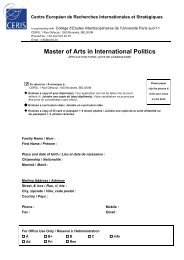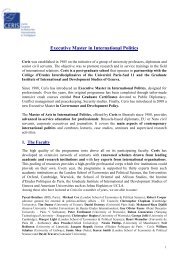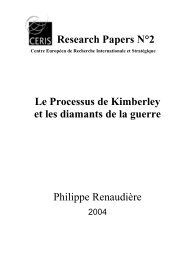hydropolitics of the tigris - euphrates river basin with - ceris.be
hydropolitics of the tigris - euphrates river basin with - ceris.be
hydropolitics of the tigris - euphrates river basin with - ceris.be
Create successful ePaper yourself
Turn your PDF publications into a flip-book with our unique Google optimized e-Paper software.
Seyhan dam), <strong>the</strong> politics <strong>of</strong> funding had changed in <strong>the</strong> post Cold-War environment. In <strong>the</strong> 1960’s when<br />
Turkey announced its plans to construct <strong>the</strong> Keban dam, <strong>the</strong>ir largest dam to date, <strong>the</strong>y automatically turned<br />
to <strong>the</strong> World Bank and <strong>the</strong> US Agency for International Development (USAID). These institutions had an<br />
established history <strong>of</strong> funding infrastructure projects but this had <strong>be</strong>gun to change.<br />
“Starting as early as 1950, <strong>the</strong> bank had developed a set <strong>of</strong> policy guidelines about <strong>the</strong> construction <strong>of</strong> dams<br />
that it was <strong>be</strong>ing asked to finance. If a dam were to <strong>be</strong> situated on a <strong>river</strong> involving more than one state, <strong>the</strong><br />
bank would work to establish a balance <strong>be</strong>tween <strong>the</strong> water rights <strong>of</strong> all riparians and <strong>the</strong> <strong>be</strong>nefits to <strong>be</strong><br />
derived from <strong>the</strong> realisation <strong>of</strong> <strong>the</strong> new project.” 19<br />
Financing <strong>of</strong> GAP: Turkey versus The World<br />
The World Bank statement, in this case, referred specifically to Syria and Iraq. Eventually <strong>the</strong> World Bank<br />
agreed to contribute to funding <strong>the</strong> Keban Dam and later <strong>the</strong> Karakaya Dam projects but only on <strong>the</strong><br />
condition that a specified minimum flow was maintained for downstream users. 20 However Turkey persisted<br />
in its unilateral approach to water projects <strong>with</strong>out consulting downstream users, effectively closing this<br />
source <strong>of</strong> funds. Turkey did manage to secure limited financial assistance from some Western governments<br />
and Israel but it <strong>be</strong>came apparent that Turkey would have to provide a large share <strong>of</strong> funding for GAP. There<br />
were financial pressures and economic consequences as Turkey channelled billions <strong>of</strong> dollars into <strong>the</strong><br />
project. By 2002 almost $14 billion (USD) had <strong>be</strong>en spent on GAP and most <strong>of</strong> this had come from Turkey.<br />
This resulted in high inflation (70% in <strong>the</strong> early 1990’s), and up to 80% <strong>of</strong> <strong>the</strong> GDP <strong>be</strong>ing spent on public<br />
debt. The Turkish Lira was also drastically devalued, almost 100% since <strong>the</strong> early 1990’s. 21<br />
The Politics <strong>of</strong> GAP<br />
The provinces <strong>be</strong>ing developed by GAP border on Syria and Iraq and are home to <strong>the</strong> ethnic population <strong>of</strong><br />
Kurds who also inhabit neighbouring territories in Syria and Iraq. The Kurds account for about half <strong>of</strong> <strong>the</strong><br />
population in <strong>the</strong> Anatolia region, <strong>with</strong> <strong>the</strong> remainder <strong>be</strong>ing Turkish and a small percent <strong>of</strong> Arabs. 22 As an<br />
ethnic minority <strong>the</strong> Kurdish population has a natural suspicion <strong>of</strong> <strong>the</strong> Government. Within its ranks can <strong>be</strong><br />
found political components agitating for an independent Kurdish territory or Kurdistan. One <strong>of</strong> <strong>the</strong> <strong>be</strong>st<br />
12





